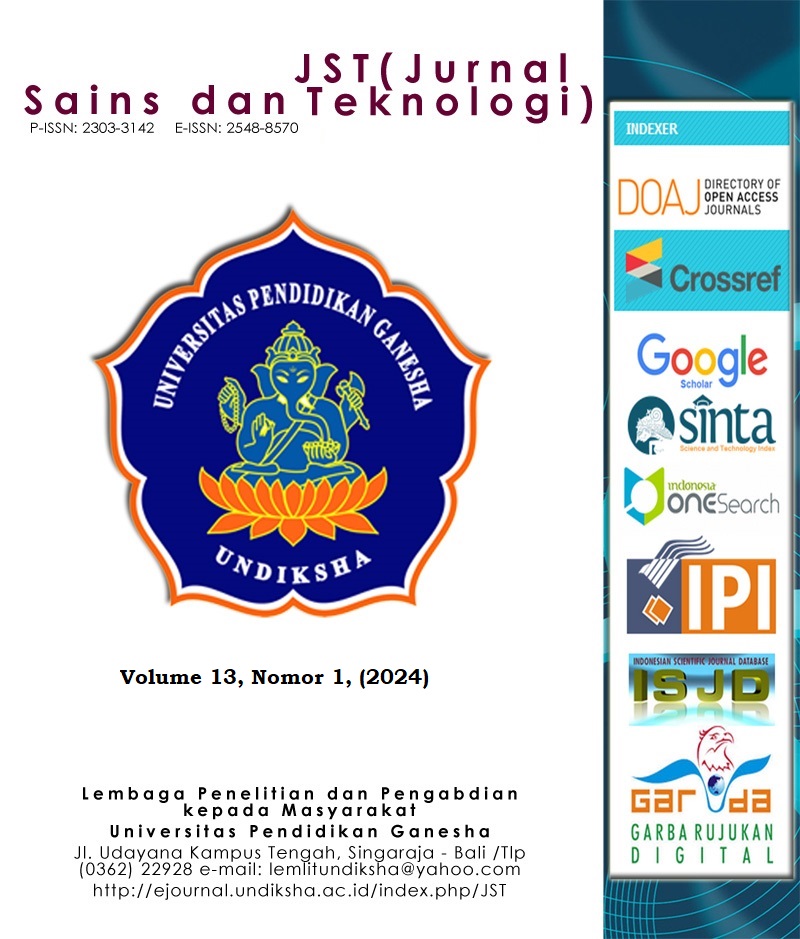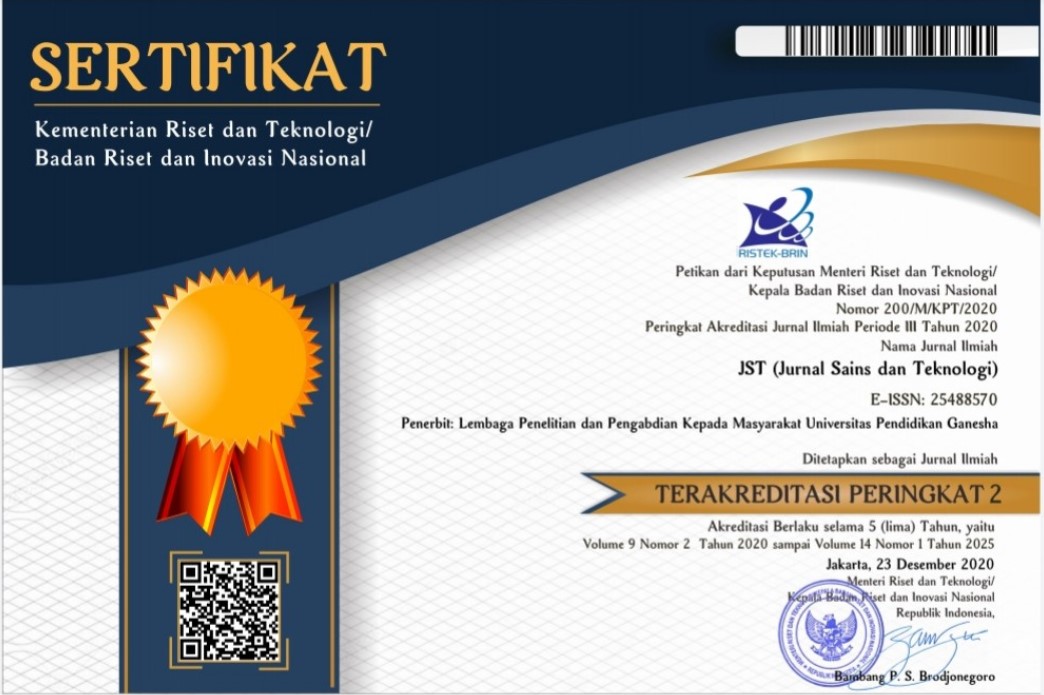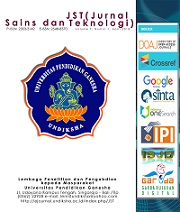The Impact of Card-Based Learning Methods on Math Learning
DOI:
https://doi.org/10.23887/jstundiksha.v13i1.65294Keywords:
Card-Based Learning Methods, Mathematics Learning, Education LevelsAbstract
There have been many applications of card-based learning methods in education, one of which is in mathematics lessons. However, no one has discussed more specifically the impact of card-based learning methods with many variations, such as making math, card sorting, index cards, flashcards and other cards in mathematics lessons. This research aims to analysed how card-based learning methods significantly impact mathematics learning. The methods used in this research are quantitative and meta-analysis. Data sources are research results relevant to the research topic and meet the inclusion and exclusion criteria. Data were analysed using JASP software by inputting Effect Size (ES) and Standard Error (SE) values. The data collection method uses a literature study. The cumulative data analysis of the card-based learning method showed many variations in mathematics learning, totalling 68%. The analysis results based on the type of card that has the highest influence on mathematics learning is card sort, with a percentage of 73% in the medium category. These results show that the card-based method significantly impacts mathematics learning. So, the results of this research can be used as a reference for applying card-based methods in mathematics lessons.
References
Adawiyah, A. R., & Kowiyah, K. (2021). Analisis Kebutuhan Pengembangan Permainan Kartu Domino sebagai Media Pembelajaran Operasi Hitung Perkalian Siswa Kelas IV SD. Ideas: Jurnal Pendidikan, Sosial, Dan Budaya, 7(3), 115–120. https://doi.org/10.32884/ideas.v7i3.435.
Aisah, I. (2016). Effect of Fun Teaching Methods Using Flash Card on Motivation and Learning Mathematics. ITEJ (Information Technology Engineering Journals), 1(1), 59–70. https://doi.org/10.24235/itej.v1i1.5.
Alenezi, M., Wardat, S., & Akour, M. (2023). The Need of Integrating Digital Education in Higher Education: Challenges and Opportunities. Sustainability, 15(6), 4782. https://doi.org/10.3390/su15064782.
Amir, A., Azmin, N., Rubianti, I., & Olahairullah, O. (2021). Meningkatkan Motivasi Dan Hasil Belajar Siswa Melalui Model Pembelajaran Index Card Match Pada Pelajaran IPA. Jurnal Pendidikan Ilmu Pengetahuan Alam (JP-IPA), 2(1), 1–6. https://doi.org/10.56842/jp-ipa.v2i01.48.
Anggraeni, A. A. A., Veryliana, P., & Fatkhu R, I. F. R. (2019). Pengaruh Model Pembelajaran Kooperatif Tipe Make A Match terhadap Motivasi dan Hasil Belajar Matematika. International Journal of Elementary Education, 3(2), 218–225. https://doi.org/10.23887/ijee.v3i2.18552.
Anggraini, V., & Jufri, L. H. (2017). Enhancing Mathematical Students’ Learning Result Using Make A Match And Index Card Match Learning Strategies In Students Class VIII Smpn 1 Koto XI Tarusan School Year 2016/2017. 6, 201–206. https://doi.org/https://doi.org/10.31980/mosharafa.v6i2.307.
Annisa, F., & Marlina, M. (2019). Penerapan Model Pembelajaran Kooperatif Tipe Index Card Match Terhadap Aktivitas Dan Hasil Belajar Matematika Peserta Didik. Jurnal Basicedu, 3(4), 1047–1054. https://doi.org/10.31004/basicedu.v3i4.209.
Aprilika, D., & Egok, A. S. (2022). Penerapan Strategi Card Sort pada Pembelajaran IPA Siswa Kelas V SD Negeri 2 Lubuk Ngin. Linggau Journal of Elementary School Education, 2(2), 15–25. https://doi.org/10.55526/ljese.v2i2.264.
Artaga, R. C. (2021). Mastery of Science Concepts Improves Scientific Attitude in Elementary School Students. Jurnal Ilmiah Sekolah Dasar, 5(4), 606–612. https://doi.org/10.23887/jisd.v5i4.37897.
Batubara, I. H. (2019). Improving student’s critical thinking ability through guided discovery learning methods assisted by geogebra. International Journal for Educational and Vocational Studies, 1(2), 116–119. https://doi.org/10.29103/ijevs.v1i2.1371.
Bicer, A. (2021). A systematic literature review: Discipline-specific and general instructional practices fostering the mathematical creativity of students. International Journal of Education in Mathematics, Science and Technology, 9(2), 252–281. https://doi.org/10.46328/IJEMST.1254.
Bicer, A., Bicer, A., Perihan, C., & Lee, Y. (2022). Pre-service teachers’ preparations for designing and implementing creativity-directed mathematical tasks and instructional practices. Mathematics Education Research Journal, 34(3), 491–521. https://doi.org/10.1007/s13394-022-00409-x.
Bordoloi, R., Das, P., & Das, K. (2021). Perception towards online/blended learning at the time of Covid-19 pandemic: an academic analytics in the Indian context. Asian Association of Open Universities Journal, 16(1), 41–60. https://doi.org/10.1108/AAOUJ-09-2020-0079.
Budiarti, T. (2016). Utilization Of Number Card Media in Comparisoning and Ordering Two Number to Two Number Using The Game Method to Increase Mathematics Learning Outcomes for Class 1 State Elementary School Karanganyar 03 District Gandrungmangu 2018/2019. Social, Humanities, and Educational Studies (SHEs): Conference Series, 4(5), 263–267. https://doi.org/10.20961/shes.v4i5.65992.
Cahyawati, C., & Eminita, V. (2021). Pengaruh Model Pembelajaran Mind Mapping Dengan Metode Drill Terhadap Hasil Belajar Matematika Siswa. FIBONACCI: Jurnal Pendidikan Matematika Dan Matematika, 7(1), 77–84. https://doi.org/10.24853/fbc.7.1.77-84.
Damayanti, A. E., Stavrianoudaki, A., & Peace, O. O. (2024). Improving Natural Science Learning Outcomes on Natural Events Material Through Cooperative Learning Models of Teams Games Tournament Type for Class V Elementary School Students. Indonesian Journal of Education Research (IJoER), 5(2), 43–49. https://doi.org/10.37251/ijoer.v5i2.879.
Dina, A., Mawarsari, V. D., & Suprapto, R. (2015). Implementasi kurikulum 2013 pada perangkat pembelajaran model discovery learning pendekatan scientific terhadap kemampuan komunikasi matematis materi geometri SMK. Jurnal Karya Pendidikan Matematika, 2(1), 22–31. https://doi.org/10.26714/jkpm.2.1.2015.%25p.
Eli, J. A., Mohr-Schroeder, M. J., & Lee, C. W. (2013). Mathematical Connections and Their Relationship to Mathematics Knowledge for Teaching Geometry. School Science and Mathematics, 113(3), 120–134. https://doi.org/10.1111/ssm.12009.
Fadilah, F. (2020). Penerapan Model Pembelajaran Make A Match Untuk Meningkatkan Hasil Belajar Matematika Pada Siswa SMP Muhammadiyah 56 Medan TA. 2020/2021. Journal Mathematics Education Sigma [JMES], 1(2), 73–80. https://doi.org/10.30596/jmes.v1i2.5189.
Fahrul, M. R., Wahyuni, M., Hidayat, A., Fauzan, A., & Fauziddin, F. (2021). The Effect of ICM Active Learning Strategies on Students’ Mathematics Learning Outcomes in JHS 2 Bangkinang. International Journal of Educational Dynamics, 3(2), 89–98. https://doi.org/10.24036/ijeds.v3i2.406.
Fajarianto, O., Tresnawati, N., Wulandari, T. C., & Ahmad, A. (2022). Differences of Mathematics Learning Results between Make a Match Cooperative Methods and Expository Methods. EDUTEC: Journal of Education And Technology, 6(1), 141–149. https://doi.org/10.29062/edu.v6i1.450.
Ferdiana, V., & Mulyatna, F. (2020). Pengaruh Model Pembelajaran Kooperatif Tipe Make a Match terhadap Pemahaman Konsep Matematika Siswa. Prosiding Seminar Nasional Sains, 1(1), 442–446.
Fitria, Y., Kenedi, A. K., & Syukur, S. K. (2021). The Effect of Scientific Approach on Elementary School Students’learning Outcomes in Science Learning. JPsd (Jurnal Pendidikan Sekolah Dasar), 7(1), 78–90. https://doi.org/10.30870/jpsd.v7i1.10353.
Fitriana, F. (2023). Pengaruh Model Pembelajaran Kooperatif Tipe Make A Match Terhadap Hasil Belajar Matematika Peserta Didik Kelas III SDN 5 Rasau Jaya. ULIL ALBAB: Jurnal Ilmiah Multidisiplin, 3(1), 45–50. https://doi.org/10.56799/jim.v3i1.2512.
Gosachi, I. M. A., & Japa, I. G. N. (2020). Model Pembelajaran Make A Match Berbantuan Media Kartu Gambar Meningkatkan Hasil Belajar Matematika. Jurnal Pedagogi Dan Pembelajaran, 3(2), 152. https://doi.org/10.23887/jp2.v3i2.25260.
Gris, G., & Bengtson, C. (2021). Assessment Measures in Game-based Learning Research. International Journal of Serious Games, 8(1), 3–26. https://doi.org/10.17083/ijsg.v8i1.383.
Hakiki, M., & Cinta, D. P. (2021). Upaya Meningkatkan Proses Dan Hasil Belajar Matematika Menggunakan Model Pembelajaran Index Card Match Di Kelas V SD Negeri 60/II Muara Bungo Kecamatanrimbo Tengah Kabupaten Bungo. Jurnal Inovasi Pendidikan Dan Teknologi Informasi (JIPTI), 2(1), 18–24. https://doi.org/10.52060/pti.v1i2.632.
Haleem, A., Javaid, M., Qadri, M. A., & Suman, R. (2022). Understanding the role of digital technologies in education: A review. Sustainable Operations and Computers, 3, 275–285. https://doi.org/10.1016/j.susoc.2022.05.004.
Hendra, Y., & Rahayu, T. (2020). The Effectiveness of Teams Games Tournament (TGT) and Make A Match Learning Models on Collaboration Ability in Science Learning-Meta-Analysis. International Journal of Elementary Education, 4(4), 510–518. https://doi.org/10.23887/ijee.v4i4.30205.
Herawati, E. (2017). Upaya meningkatkan motivasi dan hasil belajar siswa menggunakan media pembelajaran kartu domino matematika pada materi pangkat tak sebenarnya dan bentuk akar kelas IX SMP Negeri Unggulan Sindang Kabupaten Indramayu. JNPM (Jurnal Nasional Pendidikan Matematika), 1(1), 66–87. https://doi.org/10.33603/jnpm.v1i1.254.
Hossain, M. A., & Yasmin, F. (2022). Emergency online teaching-learning model in the context of higher-level education due to the COVID-19 pandemic. Journal of Social, Humanity, and Education, 2(4), 327–341. https://doi.org/10.35912/jshe.v2i4.1109.
Januar, dkk, Ayu, I., Ratna, P., & Dewi, N. (2020). Pengembangan Media Flashcard Untuk Meningkatkan Kemampuan Mengenal Warna Pada Anak Usia Dini. Journal for Lesson and Learning Studies, 3(3), 4. https://doi.org/https://doi.org/10.23887/jlls.v3i3.29391.
Juliani, A., Mustadi, A., & Lisnawati, I. (2021). “Make A Match Model” for Improving the Understanding of Concepts and Student Learning Results. Indonesian Journal on Learning and Advanced Education (IJOLAE), 3(1), 48–56. https://doi.org/10.23917/ijolae.v3i1.10269.
Juniantari, I. G. A. (2019). Penerapan Pembelajaran Make a Match untuk Meningkatkan Minat dan Hasil Belajar Matematika Kelas I Semester I di SD Negeri 4 Pertima Tahun Pembelajaran 2017/2018. Adi Widya: Jurnal Pendidikan Dasar, 4(1), 18–28. https://doi.org/10.25078/aw.v4i1.926.
Khasanah, S. K. (2020). Increasing Student Learning Outcomes in Mathematics About Operational Numbers With Role Playing Method of Colors Media in Class V SDN Karanganyar Gunung 02 Semarang. Social, Humanities, and Educational Studies (SHES): Conference Series, 3(4), 383–391. https://doi.org/10.20961/shes.v3i4.53372.
Komalasari, K. (2016). Pengaruh Penggunaan Media Flash Card Math terhadap Hasil Belajar Metematika. JKPM (Jurnal Kajian Pendidikan Matematika), 1(2), 237–246. https://doi.org/10.30998/jkpm.v1i2.1191.
Liu, S., Keeley, J. W., Sui, Y., & Sang, L. (2021). Impact of distributed leadership on teacher job satisfaction in China: The mediating roles of teacher autonomy and teacher collaboration. Studies in Educational Evaluation, 71. https://doi.org/10.1016/j.stueduc.2021.101099.
Liu, Y., Bellibaş, M. Ş., & Gümüş, S. (2021). The Effect of Instructional Leadership and Distributed Leadership on Teacher Self-efficacy and Job Satisfaction: Mediating Roles of Supportive School Culture and Teacher Collaboration. Educational Management Administration and Leadership, 49(3), 430–453. https://doi.org/10.1177/1741143220910438.
Lubis, R. R., Rambe, N., Azhar, P. C., Sugma, A. R., & Franklin, T. N. D. (2023). Development of Digital-Based Smart Card Learning Media to Improve the Learning Outcomes of Madrasah Ibtidaiyah Students. MUDARRISA: Jurnal Kajian Pendidikan Islam, 15(1), 1–24. https://doi.org/10.18326/mdr.v15i1.1-24.
Manurung, A. S., Halim, A., & Rosyid, A. (2022). Cooperative Learning Implementation Model to Improve Mathematics Learning Outcomes. Jurnal Basicedu, 6(1), 877–885. https://doi.org/10.31004/basicedu.v6i1.2026.
Marwati, A., Romdanih, R., & Rahmad, I. N. (2020). Peningkatan Pemahaman Konsep Matematika Materi Menghitung Keliling dan Luas Segitiga melalui Model Pembelajaran Index Card Match. Prosiding Seminar Nasional Pendidikan STKIP Kusuma Negara II, 235–243.
Meriyati, M., Shaulita, R., & Turnip, L. N. (2018). The Improving Of Mathematic Learning Outcomes Through Problembased Learning With Card Sort Strategy For Fifth Grade Students. Al-Jabar: Jurnal Pendidikan Matematika, 9(2), 199–208. https://doi.org/10.24042/ajpm.v9i2.3719.
Miftahuddin, M., & Arofah, F. (2020). Pengembangan Permainan Kartu Hitung Sebagai Media Pembelajaran Perkalian Pada Siswa Kelas IV. INOPENDAS: Jurnal Ilmiah Kependidikan, 3(1), 1–9. https://doi.org/10.24176/jino.v3i1.4525.
Muncarno, M. (2015). Penerapan Model Active Learning Permainan Card Sort Untuk Meningkatkan Aktivitas Dan Hasil Belajar Matematika Siswa Kelas IV SDN 05 Metro Selatan. AKSIOMA Journal of Mathematics Education, 16(1994), 1–37. https://doi.org/10.24127/ajpm.v4i2.294.
Muslimin, M., Tendri, M., & Khasanah, I. (2021). Pengaruh Media Pembelajaran Flash Card Math Terhadap Hasil Belajar Matematika Materi Himpunan Kelas VII. UNION: Jurnal Ilmiah Pendidikan Matematika, 9(1), 13–21. https://doi.org/10.30738/union.v9i1.6289.
Nasution, M. D., & Prastika, C. (2020). Upaya Meningkatan Hasil Belajar Siswa Melalui Model Pembelajar Kooperatif Make-A Math Pada Materi Limit Fungsi Di Kelas XI Man 1 Medan. Jurnal Penelitian, Pendidikan Dan Pengajaran, 1(1), 8–15. https://doi.org/10.30596/jppp.v1i1.3059.
Ningsih, P. R. (2012). Penerapan Strategi Mind Mapping (Peta Pikiran) dengan Kombinasi Flash Card pada Pembelajaran Matematika Materi Pokok Trigonometri di Kelas XI SMA Negeri I Babat Lamongan. Gamatika, 3(1), 10–16.
Nugraha, D. (2022). Literasi digital dan pembelajaran sastra berpaut literasi digital di tingkat sekolah dasar. Jurnal Basicedu, 6(6), 9230–9244. https://doi.org/10.31004/basicedu.v6i6.3318.
Nurfiati, N., Mandailina, V., Mahsup, M., Syaharuddin, S., & Abdillah, A. (2020). Effect of Make A Match Learning Model on Student Learning Outcomes on Statistical Materials. Justek : Jurnal Sains Dan Teknologi, 3(1), 1–8. https://doi.org/10.31764/justek.v3i1.3509.
Nurfitriyanti, M., & Lestari, W. (2016). Penggunaan Alat Peraga Kartu Domino Terhadap Hasil Belajar Matematika. JKPM (Jurnal Kajian Pendidikan Matematika), 1(2), 247–256. https://doi.org/10.30998/jkpm.v1i2.1192.
Nurhayati, E., Rizaldi, D. R., & Fatimah, Z. (2020). The Correlation of Digital Literation and STEM Integration to Improve Indonesian Students’ Skills in 21st Century. International Journal of Asian Education, 1(2), 73–80. https://doi.org/10.46966/ijae.v1i2.36.
Permatasari, D., & Ahmad, M. (2022). Pengaruh Metode Pembelajaran Index Card Match Terhadap Kemampuan Mehamami Soal Cerita Matematika Siswa Kelas IV SDN Rambutan 02. Jurnal Cendekia : Jurnal Pendidikan Matematika, 6(3), 3192–3202. https://doi.org/10.31004/cendekia.v6i3.1543.
Ramadhani, W. P., & Indrawati, A. G. (2020). Penerapan Model Pembelajaran Kooperatif Tipe Teams Games Tournaments (Tgt) Dengan Media Pembelajaran Ultpygo Untuk Meningkatkan Hasil Belajar Matematika Siswa. JIPMat, 5(2), 211–230. https://doi.org/10.26877/jipmat.v5i2.5480.
Riana, N. K. I., Tegeh, I. M., & Pudjawan, K. (2020). Pengaruh Model Pembelajaran Make A Match dengan Berbantuan Media Kartu Berpasangan Terhadap Hasil Belajar Matematika. Jurnal Penelitian Dan Pengembangan Pendidikan, 4(3), 388–397. https://doi.org/10.23887/jppp.v4i3.27425.
Rizkyani, M., & Amelia, W. (2020). Peningkatan Hasil Belajar Matematika Materi Satuan Panjang Melalui Media Flash Card Pada Siswa Kelas IIB SDN Kayuringin Jaya VI Bekasi. Jurnal Ilmiah Pendidikan Guru Sekolah Dasar, 4(2), 141–148. https://doi.org/10.31326/jipgsd.v4i2.683.
Saptika, Y. A., Rosdiana, F., & Sariningsih, R. (2018). Analisis kesalahan siswa dalam menyelesaikan soal kemampuan komunikasi matematis pada materi bangun datar. JPMI (Jurnal Pembelajaran Matematika Inovatif), 1(5), 873–880. https://doi.org/10.22460/jpmi.v1i5.p873-880.
Saputra, A., Zulkarnain, Z., & Saragih, S. (2019). Application of Cooperative Learning Models of Think Pair Shere Type to Improve Student Mathematics Learning Outcomes. Journal of Educational Sciences, 3(2), 237–248. https://doi.org/10.31258/jes.3.2.p.237-248.
Saputra, N., Hikmah, N., Yustitia, V., Saputra, M., Wahab, A., & Junaedi, J. (2021). Implementation of Online Learning Using Online Media, During the Covid 19 Pandemic. Budapest International Research and Critics Institute (BIRCI-Journal): Humanities and Social Sciences, 4(2), 1802–1808. https://doi.org/10.33258/birci.v4i2.1857.
Sarah, K., Mursalin, M., Muliana, M., Nuraina, N., & Rohantizani, R. (2021). The Influence of the Inside Outside Circle Cooperative Learning Model on Students’ Mathematical Communication Ability. International Journal for Educational and Vocational Studies, 3(3), 177–185. https://doi.org/10.29103/ijevs.v3i3.4981.
Sari, D. N., Niniwati, & Zuzano, F. (2014). Peningkatan Aktivitas Dan Hasil Belajar Siswa Kelas V Pada Pembelajaran Matematika Melalui Strategi Card Sort Di Sdn 20 Berok Gunung Panggilun. Fakultas Keguruan Dan Ilmu Pendidikan, 3(2), 8.
Sari, E. K., Wardana, M. Y. S., & Untari, Asri, M. F. (2019). Strategi Pembelajaran Card Sort Terhadap Hasil Belajar. Mimbar Pgsd …, 7(22), 244–252. https://doi.org/https://doi.org/10.23887/jjpgsd.v7i3.19401.
Sari, E. K., Wardana, M. Y. S., & Untari, M. F. A. (2019). Strategi Pembelajaran Card Sort Terhadap Hasil Belajar. Mimbar PGSD Undiksha, 7(3), 244–252. https://doi.org/10.23887/jjpgsd.v7i3.19401.
Sehartian, D. Y., & Adriyani, Z. (2023). The Influence of Flashcard Media on Science Learning Outcomes for Islamic Elementary School Grade. Scaffolding: Jurnal Pendidikan Islam Dan Multikulturalisme, 5(1), 427–438. https://doi.org/10.37680/scaffolding.v5i1.2561.
Sharma, L., & Shree, S. (2023). Exploring the online and blended modes of learning for post-COVID-19: A study of higher education institutions. Education Sciences, 13(2), 142. https://doi.org/10.3390/educsci13020142.
Simamora, R. E., & Saragih, S. (2018). Improving Students’ Mathematical Problem Solving Ability and Self-Efficacy through Guided Discovery Learning in Local Culture Context. International Electronic Journal of Mathematics Education, 14(1), 61–72. https://doi.org/10.12973/iejme/3966.
Soleha, S. (2016). Penerapan Model Pembelajaran Kooperatif Tipe Make A Match Untuk Meningkatkan Hasil Belajar Matematika Siswa Kelas IV SD Negeri 2 Gayau Sakti Tahun Pelajaran 2014/2015. AKSIOMA Journal of Mathematics Education, 5(1), 68–74. https://doi.org/10.24127/ajpm.v5i1.467.
Solehah, A., Mandailina, V., Mahsup, M., Syaharuddin, S., & Abdillah, A. (2023). Upaya Meningkatkan Hasil Belajar Siswa Pada Pelajaran Matematika Materi Bilangan Bulat Melalui Strategi Card Sort Di Kelas IV Mts Mutiara Sunggal Tahun Pelajaran 2017/2018. Euler: Jurnal Ilmiah Matematika, Sains Dan Teknologi, 11(1), 136–145. https://doi.org/10.34312/euler.v11i1.20219.
Sudrajat, A., Salsabila, F. G., & Marini, A. (2023). Digital-Based Flash Card to Increase Social Studies Learning Outcomes for Elementary School Students in The Fourth Grade. Journal of Education Technology, 7(2), 235–246. https://doi.org/10.23887/jet.v7i2.63327.
Sunedi, D. P. O. (2023). Implementasi Model Pembelajaran Kooperatif Tipe Make A Match untuk Meningkatkan Hasil Belajar Matematika pada Siswa Kelas IV SD. Journal of Education Action Research, 7(2), 237–242. https://doi.org/10.23887/jear.v7i2.54626.
Suparman, S., Tamur, M., Yunita, Y., Wijaya, T. T., & Syaharuddin, S. (2021). Using Problem-Based Learning to Enhance Mathematical Abilities of Primary School Students: A Systematic Review and Meta-Analysis. JTAM (Jurnal Teori Dan Aplikasi Matematika), 5(1), 144–161. https://doi.org/10.31764/jtam.v5i1.3806.
Sutopo, S. (2019). Peningkatan Aktivitas dan Hasil Belajar Matematika Tentang KPK dengan Model Pembelajaran Card Sort Berbantu Media Kartu Bilangan. ANARGYA: Jurnal Ilmiah Pendidikan Matematika, 2(2), 92–98. https://doi.org/10.24176/anargya.v2i2.3945.
Syaharuddin, Mulyono, S., Utami, P. R., Ghajali, M., Yustia, V., Nurhayati, & Mardekawati, A. (2021). Publikasinya, Penelitian Meta Analisis Menggunakan Software JASP Pengumpulan Data Sampai Publikasinya (1st ed.). CV. Pena Persada.
Tahir, R., & Wang, A. I. (2020). Codifying Game Based Learning: Development and Application of LEAGUÊ Framework for Learning Games. Electronic Journal of E-Learning, 18(1), 69–87. https://doi.org/10.34190/ejel.20.18.1.006.
Tong, J., & Tobe, A. A. (2022). Penerapan Model Pembelajaran Kooperatif Tipe Make A Match Untuk Meningkatkan Hasil Belajar Matematika Siswa Kelas Iii Di SD Muhammadiyah 2 Kupang. Jurnal Pendidikan Dasar Flobamorata, 3(1), 263–269. https://doi.org/10.51494/jpdf.v3i1.662.
Ulfa, S. ., Sabrun, S., & Agusfianuddin, A. (2018). Penerapan Model Pembelajaran Kooperatif Tipe Picture And Picture Dengan Media Flash Card Untuk Meningkatkan Hasil Belajar Matematikasiswa Kelas VIIA SMPN 3 Sikur Pada Materi Pokok Pecahan Tahun Pelajaran 2016/2017. Jurnal Media Pendidikan Matematika, 5(1), 21–26. https://doi.org/10.33394/mpm.v5i1.501.
Wardani, K. W., & Setyadi, D. (2020). Pengembangan media pembelajaran matematika berbasis macromedia flash materi luas dan keliling untuk meningkatkan motivasi belajar siswa. Scholaria: Jurnal Pendidikan Dan Kebudayaan, 10(1), 73–84. https://doi.org/10.24246/j.js.2020.v10.i1.p73-84.
Wulan, L. P. D., Dibia, I. K., & Suarjana, M. (2013). Penerapan Model Pembelajaran Kooperatif Tipe Tgt Berbantuan Kartu Domino untuk Meningkatkan Hasil Belajar Matematika Siswa Kelas IV. Jurnal Pendidikan Matematika, 1(1). https://doi.org/10.23887/jjpgsd.v1i1.1445.
Yanti, A. A. (2024). The Influence of The Match Mine Type Cooperative Learning Model on The Mathematics Communication Ability of Class Vii Students at Mts Annizhomiyyah Jaha-Labuan. International Journal Multidisciplinary Science, 3(1), 45–50. https://doi.org/10.56127/ijml.v3i1.1219.
Zainal, Z., Djabba, R., & Mukhallad, W. (2024). Implementation of The Cooperative Learning Model of Index Card Match Type to Improve Student Learning Outcomes. Jurnal Eduscience (JES), 11(1), 1–10. https://doi.org/10.36987/jes.v11i1.3421.
Downloads
Published
How to Cite
Issue
Section
License
Copyright (c) 2024 Azmiatun Solehah

This work is licensed under a Creative Commons Attribution-ShareAlike 4.0 International License.
Authors who publish with the Jurnal Sains dan Teknologi (JST) agree to the following terms:
- Authors retain copyright and grant the journal the right of first publication with the work simultaneously licensed under a Creative Commons Attribution License (CC BY-SA 4.0) that allows others to share the work with an acknowledgment of the work's authorship and initial publication in this journal.
- Authors are able to enter into separate, additional contractual arrangements for the non-exclusive distribution of the journal's published version of the work (e.g., post it to an institutional repository or publish it in a book), with an acknowledgment of its initial publication in this journal.
- Authors are permitted and encouraged to post their work online (e.g., in institutional repositories or on their website) prior to and during the submission process, as it can lead to productive exchanges, as well as earlier and greater citation of published work. (See The Effect of Open Access)
















